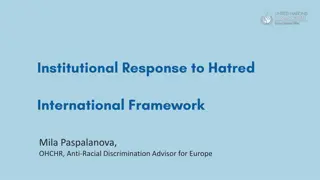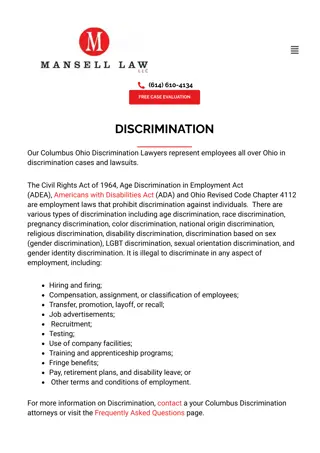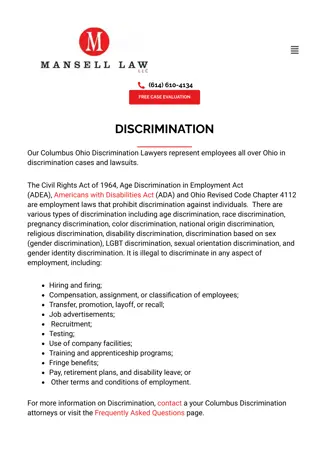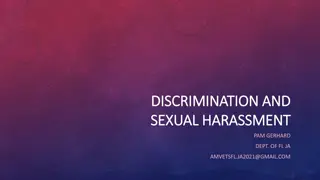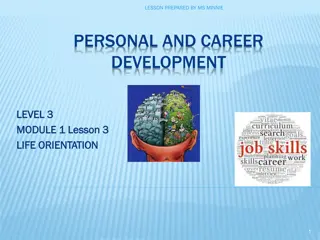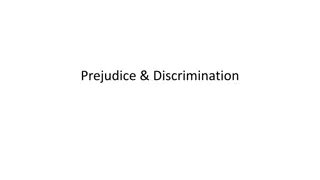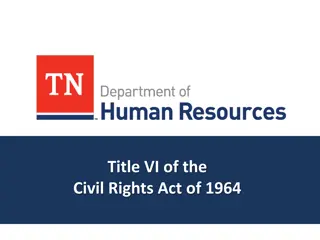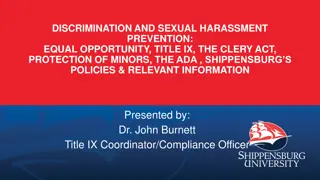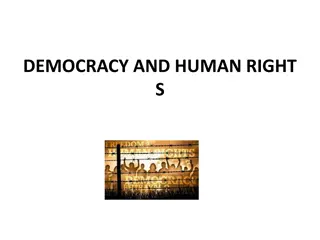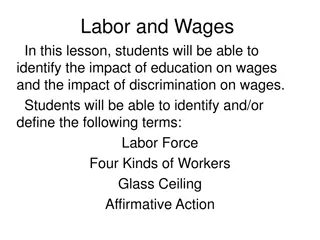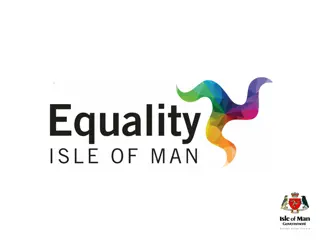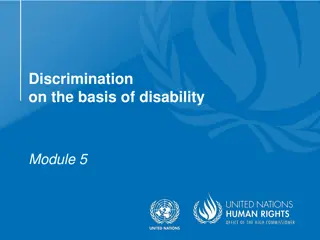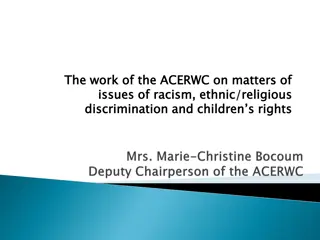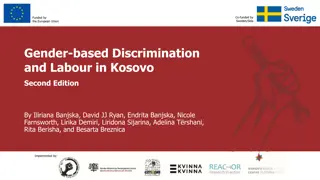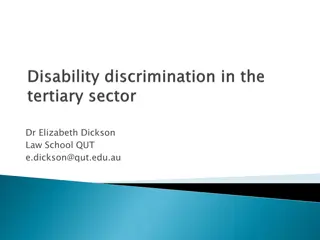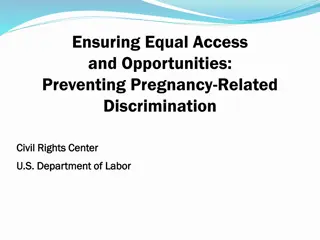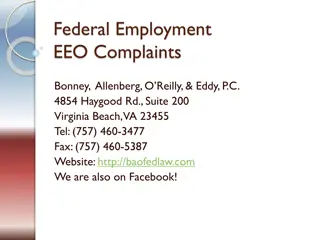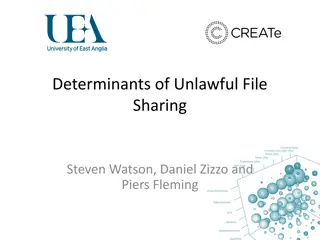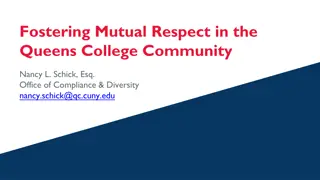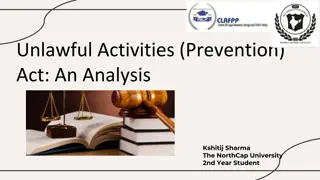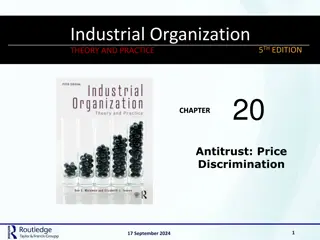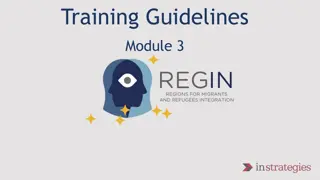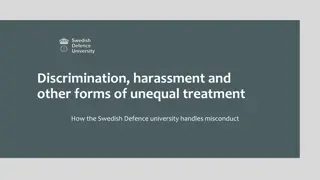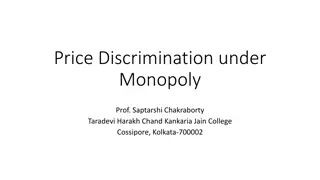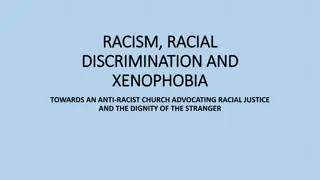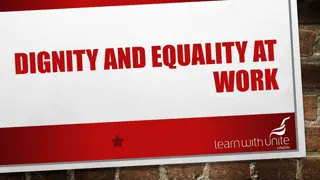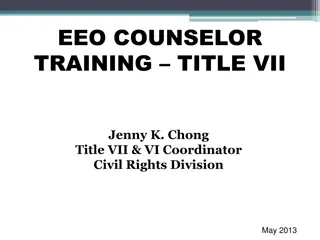TITLE IX ESSENTIALS: WHAT EVERY STUDENT NEEDS TO KNOW
Title IX of the Education Amendments of 1972 prohibits sex-based discrimination in educational programs and activities at federally funded universities. This law protects against sex discrimination and sexual harassment, outlining the roles of the Title IX Coordinator and the reporting processes for
2 views • 47 slides
Standing Up for Equality: Voices and Actions
Explore the impact of bullying and discrimination against LGBT+ individuals, witness the power of standing up for equality, and build confidence in challenging discrimination. Engage in thought-provoking questions, discussions, and activities to promote unity and support for marginalized communities
6 views • 21 slides
Understanding Employment Discrimination and Retaliation Laws
This informative content delves into the nuances of employment discrimination and retaliation, outlining types of cases, stages of legal proceedings, protected classes under M.G.L. ch. 151B, elements of prima facie cases, and burden-shifting frameworks in proving discrimination or retaliation. It ex
2 views • 23 slides
Understanding Title IX and MS State Law
Explore the essential guide to Title IX, a federal civil rights law that prohibits sex-based discrimination on university campuses. Learn about offenses covered under Title IX, the role of the Title IX office, and unlawful discrimination and harassment policies. Understand sexual harassment, sexual
2 views • 31 slides
Overview of Federal Discrimination Laws in Employment
Federal discrimination laws protect employees from discrimination, harassment, and retaliation in the workplace based on various protected characteristics. Title VII, ADA, ADEA, EPA, Lilly Ledbetter Fair Pay Act, and GINA are key federal laws ensuring fair treatment of employees. These laws cover al
5 views • 42 slides
Illegally obtained evidence
Illegally obtained evidence refers to evidence acquired through unlawful means, such as searches without warrants or extraction under duress. The Fruit of the Poisonous Tree doctrine renders evidence inadmissible if derived from illegally obtained evidence. The Exclusionary Rule prohibits the use of
2 views • 30 slides
Pennsylvania Human Relations Commission: Fighting Discrimination Across the State
The Pennsylvania Human Relations Commission (PHRC) has been combating discrimination since 1955, protecting individuals from unlawful practices in employment, education, housing, commercial property, and public accommodations. Pennsylvania law prohibits discrimination based on various factors, and t
2 views • 17 slides
International Human Rights Treaties and Recommendations for Combatting Racism
Mila Paspalanova, the Anti-Racial Discrimination Advisor for Europe at OHCHR, discusses core treaties related to racial discrimination, international conventions, and efforts to combat discrimination based on religion or belief. The content highlights the importance of ICERD, ICCPR, and other key tr
6 views • 16 slides
NYC Employment Discrimination Lawyer
New York City discrimination lawyers Mansell Law help employment discrimination victims sue under Title VII or for New York Human Rights Law violations.\n
0 views • 5 slides
Employment Discrimination Lawyer Columbus Ohio | Discrimination
Facing workplace discrimination in Columbus, Ohio? Get legal help! Employment Discrimination Lawyer Columbus Ohio. We fight for your rights.\n
0 views • 4 slides
Employment Discrimination Lawyer Columbus Ohio | Discrimination
Facing workplace discrimination in Columbus, Ohio? Get legal help! Employment Discrimination Lawyer Columbus Ohio. We fight for your rights.\n
0 views • 4 slides
Understanding Discrimination and Sexual Harassment Policy in AMVETS
This content provides insights into the policy and definitions of discrimination, sexual harassment, and examples within the context of AMVETS organization. It explains the prohibited behaviors, such as gender-based harassment, and outlines the scope of the policy in addressing discrimination based
1 views • 19 slides
Employee Rights and Anti-Discrimination Training Overview
Explore key topics in employee rights and anti-discrimination training, including protected classes, EEOC enforcement, the At-Will doctrine, and deeper insights into issues related to sex, disability, and pregnancy discrimination. Gain valuable knowledge to promote a fair and respectful work environ
1 views • 18 slides
Recognizing and Addressing Workplace Discrimination and Bullying
This lesson by Ms. Minnie focuses on identifying and handling workplace discrimination and bullying, including sexual harassment, gender discrimination, workplace bullying, and emotional abuse. It sheds light on various forms of problematic workplace relations and provides insight on dealing with su
2 views • 14 slides
Understanding Prejudice and Discrimination: Sources, Consequences, and Solutions
Explore the nature and power of prejudice, including its social, motivational, and cognitive sources, as well as the consequences of discrimination. Learn about stereotypes, racism, and discrimination, with a focus on how societal attitudes impact marginalized groups. Discover solutions to combat pr
0 views • 40 slides
Understanding Title VI of the Civil Rights Act
Title VI of the Civil Rights Act of 1964 prohibits discrimination on the basis of race, color, or national origin in programs receiving federal financial assistance. This act outlines the obligations of state agencies and recipients of federal funds to ensure equality and non-discrimination. The tra
1 views • 50 slides
Discrimination and Sexual Harassment Prevention at Shippensburg University
Dr. John Burnett, Title IX Coordinator at Shippensburg University, presents information on preventing discrimination and sexual harassment through equal opportunity, Title IX, the Clery Act, protection of minors, and the ADA. The university's policies and contact information for Dr. Burnett are prov
1 views • 24 slides
Understanding Responsible Citizenship, Human Rights, and Discrimination
Encouraging responsible citizenship entails promoting human rights, participating in civic activities, and combating discrimination. The Bill of Rights in South Africa serves as the foundation of democracy, emphasizing dignity, equality, and freedom. It is crucial to evaluate one's stance on discrim
2 views • 13 slides
Understanding Labor and Wages: Education, Discrimination, and Workers
Explore the impact of education on wages and discrimination on income in this lesson. Identify terms like Labor Force, Glass Ceiling, and more. Learn about different types of workers and their skills. Discover how education level affects wages and the distinction between blue-collar and white-collar
1 views • 16 slides
Equality Act 2017: Ensuring Equal Access and Protection from Discrimination
The Equality Act 2017 aims to harmonise and extend statutory protection from discrimination for a wider range of people in various areas such as employment, goods and services, education, public functions, premises, and associations. It identifies nine protected characteristics including race, sex,
3 views • 39 slides
Understanding Discrimination on the Basis of Disability
Manifestation of discrimination based on disability, forms of discrimination, reasonable accommodation, responsibility for combatting discrimination, and the importance of non-discrimination and equality in ensuring human rights and freedoms for persons with disabilities are explored within this mod
1 views • 18 slides
The Work of ACERWC on Racism, Discrimination, and Children's Rights
The African Committee of Experts on the Rights and Welfare of the Child (ACERWC) focuses on issues such as racism, ethnic and religious discrimination, and children's rights. Established in 1990 and ratified by 49 countries, ACERWC ensures non-discrimination, child survival, participation, and devel
0 views • 12 slides
Gender-based Discrimination in Kosovo: Research Findings and Analysis
Research conducted in Kosovo evaluates gender-based discrimination awareness and implementation of legal responsibilities. The study assesses the legal framework, reported cases, public awareness, and institutional response to discrimination. Methodologies included legal analysis, surveys, interview
0 views • 50 slides
Understanding Disability Discrimination Laws in Education
Comprehensive overview of Disability Discrimination Act 1992 (Cth), Disability Standards for Education 2005 (Cth), and the legal framework prohibiting discrimination against students with disabilities. Exploring direct and indirect discrimination, limitations of the DDA, and examples of less favorab
3 views • 40 slides
Understanding Murder in Common Law
Murder, as defined in common law, is the unlawful killing of a human being with malice aforethought. This act involves both actus reus (unlawful killing caused by the defendant) and mens rea (intention to kill or cause grievous bodily harm). Legal causation, including thin skull test, chain of causa
0 views • 18 slides
Preventing Pregnancy-Related Discrimination in Access and Opportunities
This content discusses the importance of preventing pregnancy-related discrimination in access and opportunities, covering relevant laws such as Title IX of the Education Amendments Act of 1972 and Title VII of the Civil Rights Act of 1964. It provides examples of pregnancy discrimination, ways to p
0 views • 20 slides
Understanding Federal Employment EEO Complaints Process
Federal Employment EEO Complaints involve issues of unlawful discrimination, retaliation, and hostile work environments for federal government employees. This process covers bases such as race, color, national origin, sex, age, disability, and religion. Timeliness is critical, with contact required
0 views • 20 slides
Understanding Involuntary Manslaughter: Forms and Elements
Involuntary Manslaughter encompasses two forms: Manslaughter by Unlawful and Dangerous Act and Gross Negligence Manslaughter. The former requires an unlawful act causing death, while the latter involves gross negligence leading to a fatality. Acts must be both unlawful and dangerous to constitute th
0 views • 29 slides
Determinants of Unlawful File Sharing: Insights and Implications
This comprehensive review delves into the determinants of unlawful file sharing behavior, exploring factors such as proximity to actual behavior, financial and legal considerations, and the impact on sales. It discusses the reasons behind illegal file sharing, including the influence of laws, pricin
0 views • 15 slides
Fostering Mutual Respect in the Queens College Community Training
This mandatory training at Queens College aims to review unlawful discrimination based on college policies, federal, state, and city laws as well as applicable NCAA policies. Participants are encouraged to engage in a safe and confidential learning environment to address scenarios of concern and ask
0 views • 25 slides
Analysis of the Unlawful Activities (Prevention) Act in India
The Unlawful Activities (Prevention) Act (UAPA) of 1967 is a significant component of anti-terror legislation in India, aimed at preventing activities that threaten the country's sovereignty. It has undergone amendments to address internal threats and impose reasonable restrictions on fundamental ri
0 views • 15 slides
Workplace Discrimination Policies and Procedures at Texas A&M University-Kingsville
Texas A&M University-Kingsville strictly prohibits discrimination based on various factors such as race, color, sex, religion, national origin, disability, and more. Employees are expected to maintain discrimination-free environments and report any discriminatory actions observed or brought to their
0 views • 11 slides
Antitrust and Price Discrimination: Robinson-Patman Act Overview
The Robinson-Patman Act, a significant antitrust statute, aims to prevent price discrimination that harms competition, particularly targeting sellers granting discriminatory prices. While some price discrimination can enhance efficiency, predatory discrimination poses a serious threat to competition
0 views • 30 slides
Training Guidelines and Methodology for Fighting Discrimination
The training module focuses on combating racism, xenophobia, and discrimination through practical exercises and theoretical frameworks. It includes sessions on understanding discrimination, EU frameworks, good practices, and ways to fight against various forms of discrimination. The methodology inco
0 views • 19 slides
Addressing Misconduct and Discrimination at the Swedish Defence University
The Swedish Defence University upholds a zero-tolerance policy against harassment, bullying, and discrimination, actively enforcing laws like the Swedish Discrimination Act. In addition to prohibiting various forms of discrimination, the university is establishing clear rules of order and a code of
0 views • 7 slides
Understanding Price Discrimination in Monopoly Markets
Price discrimination under monopoly occurs when businesses charge different prices to different consumer groups for the same product or service. Conditions for price discrimination include monopoly power, market segmentation, ability to separate consumer groups, and prevention of resale. Examples of
0 views • 12 slides
Understanding Racism, Racial Discrimination, and Xenophobia in the Context of an Anti-Racist Church Advocating for Justice
Racism, racial discrimination, and xenophobia are real issues that impact lives based on color, ethnicity, and cultural background. The International Convention for the Elimination of Racial Discrimination defines racism as promoting racial hatred and discrimination. The World Council of Churches (W
0 views • 9 slides
Understanding the Equality Act 2010 and Protected Characteristics
The Equality Act 2010 aims to provide a legal framework to protect individuals' rights and promote equality of opportunity. It identifies nine protected characteristics including age, disability, race, gender, religion, and more. The Act prohibits discriminatory treatment in any category, particular
0 views • 29 slides
Understanding Title VII of the Civil Rights Act
Title VII of the Civil Rights Act of 1964 prohibits employment discrimination based on various factors such as race, color, sex, religion, national origin, age, disability, and genetic information. It covers all phases of employment, including hiring, terms and conditions, benefits, and post-employm
0 views • 40 slides
Understanding the Impact of Discrimination on Health
Exploring the negative effects of discrimination on physical and mental health, this content delves into how experiencing discrimination can lead to illnesses, unhealthy habits, and additional health risks. The concept of positive discrimination to aid discriminated groups is also discussed, highlig
0 views • 20 slides







